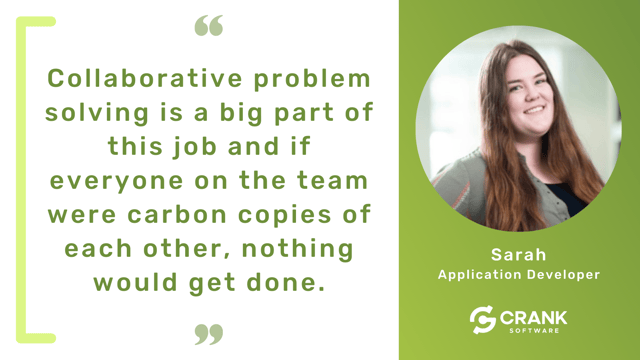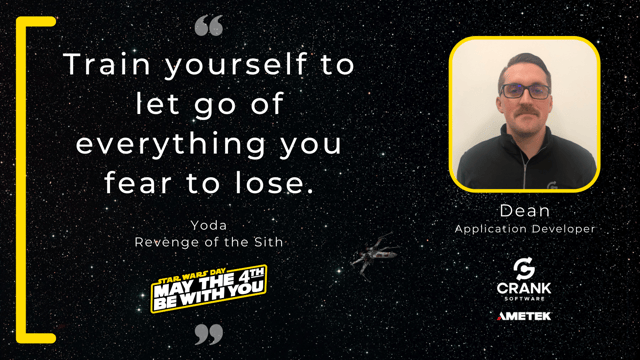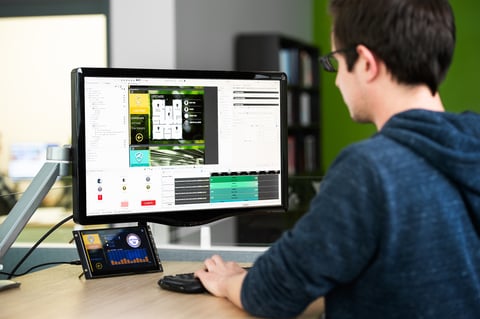Our application developers discuss their favorite professional services projects and the technical challenges they've solved.
Crank’s professional services team is a brain trust of design practitioners and coding wizards in embedded GUI development. With expert knowledge of the fundamental principles behind user experience (UX) and software development, combined with decades of experience across different industries, our team helps build the sophisticated embedded products that win markets.
Unlike your typical “meet the team” blog, we asked our application developers about their specific projects – the customer challenges and the exciting things that get them up in the morning. Hopefully this gives you a good idea of what our Professional Services experts can bring to your embedded GUI development project.
“There’s very little we can’t figure out because we’ve done of lot of this before. For the rest, we know the questions to ask and can interpret the answers quickly to get the project moving.”- Jill Douglas, Senior Software Developer at Crank
Types of embedded GUI services projects
With an application developer mix that crosses C/C++ programmers with experienced graphic designers trained in scripting and algorithmic design, there’s a range of customer products under our team’s belt. When asked their favorite project to date, two of our developers chose the same customer (anonymous due to confidentiality reasons).
“This customer had a microcontroller board that didn’t have much memory or flash, and wanted their product to look like a high-end smartphone,” said Jill Douglas, Senior Software Developer at Crank. “They wanted rich backgrounds, complex gradients, and other elements to go up against a more popular competitor in their marketplace. Getting it working to their satisfaction taught me so much about things you have to be careful of when running on low-resourced devices – lessons we can adapt to other customers.”
“We did a lot of prototyping for them, to make sure our UX designs and behavior fit into the strict constraints of their microcontroller,” added Ryan Lambert, Storyboard Application Developer. “This allowed us to explore different options with Storyboard, like using design states to visualize different aspects of the GUI’s layers without needing the actual board to run them on."
As with any development project, our embedded GUI consulting team works closely together to apply different skills and experience, often learning from each other. Each customer has unique requirements that must be met, whether it’s modernizing commercial laundries or launching the world’s most efficient electric vehicle. Depending on their size, each customer also provides different opportunities to scale GUI development, from small OEMs to Fortune 500 enterprises.

“For one of our home and commercial appliance manufacturers, we built over thirty different models off the same Storyboard GUI application base,” said Sarah Collie, Storyboard Application Developer. “Regardless of cooktop type or the number of oven cavities, we released each product off the same Storyboard application with adjustments for layout and branding, and used customizable properties to make those changes easier. We also leverage basic GUI logic and elements, like text fields and buttons, with other customers, meaning that with every new project, we become smarter and more efficient at what we do.”
Our team sees both sides of the GUI coin: the UX design and the backend integration. With customers having so much choice and flexibility with their applications, they rely on Crank Professional Services to make development decisions based on our experience building GUIs and familiarity with different hardware platforms.
“We think about embedded GUIs every day so our customers don’t have to." - Dean Shepherdson, Storyboard Application Developer at Crank
Solving the bigger embedded GUI technical challenges
Working with both small and large-scale customers presents different challenges in terms of implementing effective solutions. For some, it’s simply a matter of configuring a prototype, running it on the Storyboard simulator, and adjusting GUI elements based on user feedback. In other cases, it involves building features outside the GUI itself to support complex customer requirements.

"One of our food services manufacturing clients wanted a settings framework across their brands that gave users control over different aspects of the product,” said Dean Shepherdson, Storyboard Application Developer. “The look and feel had to be similar across brands, with customizable elements, and had to be easy to use – the last thing you want is a busy chef trying to figure out how to run their equipment. We implemented a settings feature that used one JSON file to configure everything about the GUI, from colors and branding to the actual menu structure, toggles, and animated sliders. This eliminated the need for the customer to spend development effort on multiple GUI variations and made the application very flexible across their product lines.”
A rare case involved a customer with a very constrained microprocessor, as Douglas explained. “We had to work with a board that had no memory at all, giving us major hoops to jump through in terms of loading the application file, loading the assets, and getting it to perform. By modifying the target’s runtime, we found a way to get it all loaded and running, demonstrating that we do what’s necessary to make sure the customer gets the GUI experience they want on the hardware they’ve chosen.”
Our embedded GUI Professional Services team consults on UX design, graphics, prototyping, demo creation, testing, and supports complete lifecycle development.
For more information about how we can partner with and accelerate your project, contact our team:
.png?width=180&height=67&name=Crank-AMETEK-HZ-Rev%20(4).png)




